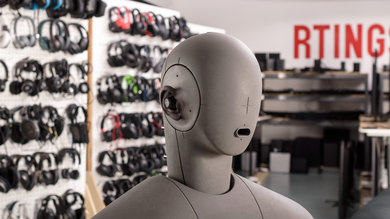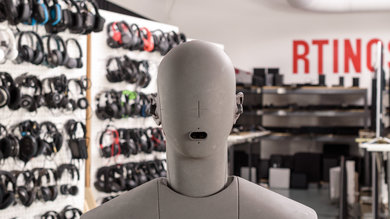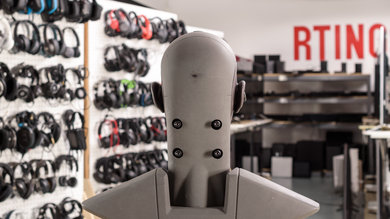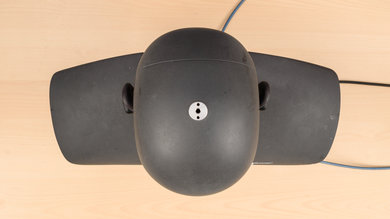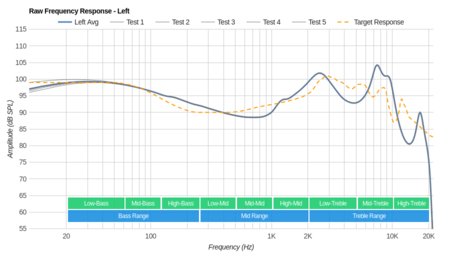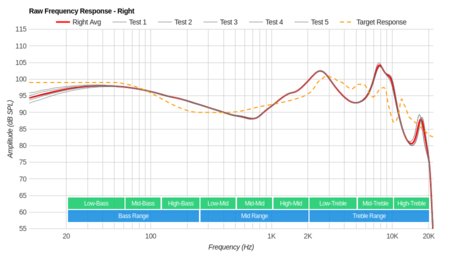The Jaybird Vista are very versatile headphones that have a fairly well-balanced sound profile. They're great for sports thanks to their compact, portable, and breathable design. They also have stability fins to help you get a more secure fit. They're rated IPX7 for water resistance, and they have a feature-rich companion app. However, their microphone performance is quite poor, and their control scheme is limited. Otherwise, they're great for active people who are looking for a pair of true wireless earbuds that can also be used in day-to-day life.
Our Verdict
The Jaybird Vista are decent for mixed usage. Their sound profile is quite well-balanced, and their companion app features a parametric EQ. While they don't passively isolate against that much ambient noise in the bass range, they do a better job of blocking out higher-pitched background chatter. They're also great for sports thanks to their stable fit and breathable design. Unfortunately, they have high wireless latency and poor microphone recording quality.
- Mostly well-balanced sound profile.
- Stable, comfortable fit.
- Impressive build quality.
- Limited control scheme for music playback.
- Poor microphone performance.
- High wireless latency.
The Jaybird Vista are satisfactory for neutral sound. Their bass response yields adequate thump and rumble, while vocals and lead instruments sound full-bodied and clear thanks to their balanced mid-range. Unfortunately, their treble range is slightly uneven. Their companion app features audio presets as well as a parametric EQ.
- Mostly well-balanced sound profile.
- Paramteric EQ and audio presets in companion app.
- Limited control scheme for music playback.
- Closed-off soundstage.
The Jaybird Vista are good for commuting. While they struggle to filter out the deep rumble of a bus and plane engines, they should isolate you from the chatter of other commuters. They're very portable, and their battery life should be sufficient for your daily commute, though it might be a bit short for long flights. Their in-ear fit is also quite comfortable to wear for extended periods of time.
- Compact, portable design.
- Impressive build quality.
- Limited control scheme for music playback.
The Jaybird Vista are great for sports. They're small, breathable, and quite comfortable. They don’t move around thanks in part to their stability fins, meaning you’ll be able to put them in and work out without having to remove them. You can also easily use their controls while you're on a run or at the gym.
- Stable, comfortable fit.
- Compact, portable design.
- Impressive build quality.
- Limited control scheme for music playback.
The Jaybird Vista are passable for office use. They block a decent amount of higher-pitched noises like coworker chatter and the hum of an A/C unit. They are comfortable to wear for extended periods of time, but their battery life might not be long enough for you to use during a full workday. They don’t leak much audio, so you won’t bother nearby colleagues, but you can’t connect them to multiple devices, which could be a bit of a nuisance.
- Stable, comfortable fit.
- High wireless latency.
The Jaybird Vista aren't suitable for wireless gaming due to their high Bluetooth latency and incompatibility with PS4 and Xbox One consoles.
The Jaybird Vista are wireless-only headphones and aren't suitable for this use.
The Jaybird Vista are middling for phone calls. They have poor microphone recording quality and struggle to isolate your voice from background noise. You may also struggle to hear what's being said if you're calling from a noisy environment.
- Stable, comfortable fit.
- Poor microphone performance.
Changelog
- Updated Nov 11, 2020: Updated review for accuracy and clarity.
- Updated Nov 21, 2019: Converted to Test Bench 1.3.1.
- Updated Nov 21, 2019: Converted to Test Bench 1.3.
- Updated Aug 30, 2019: Review published.
Check Price
Differences Between Sizes And Variants
The Jaybird Vista come in a couple of different color schemes: 'Black', 'Nimbus Gray', 'Mineral Blue', and 'Planetary Green'. We tested the 'Black' model, but expect the other color variants to perform similarly overall.
If someone comes across a new variant of these headphones, let us know in the discussions so that we can update our review.
Popular Headphones Comparisons
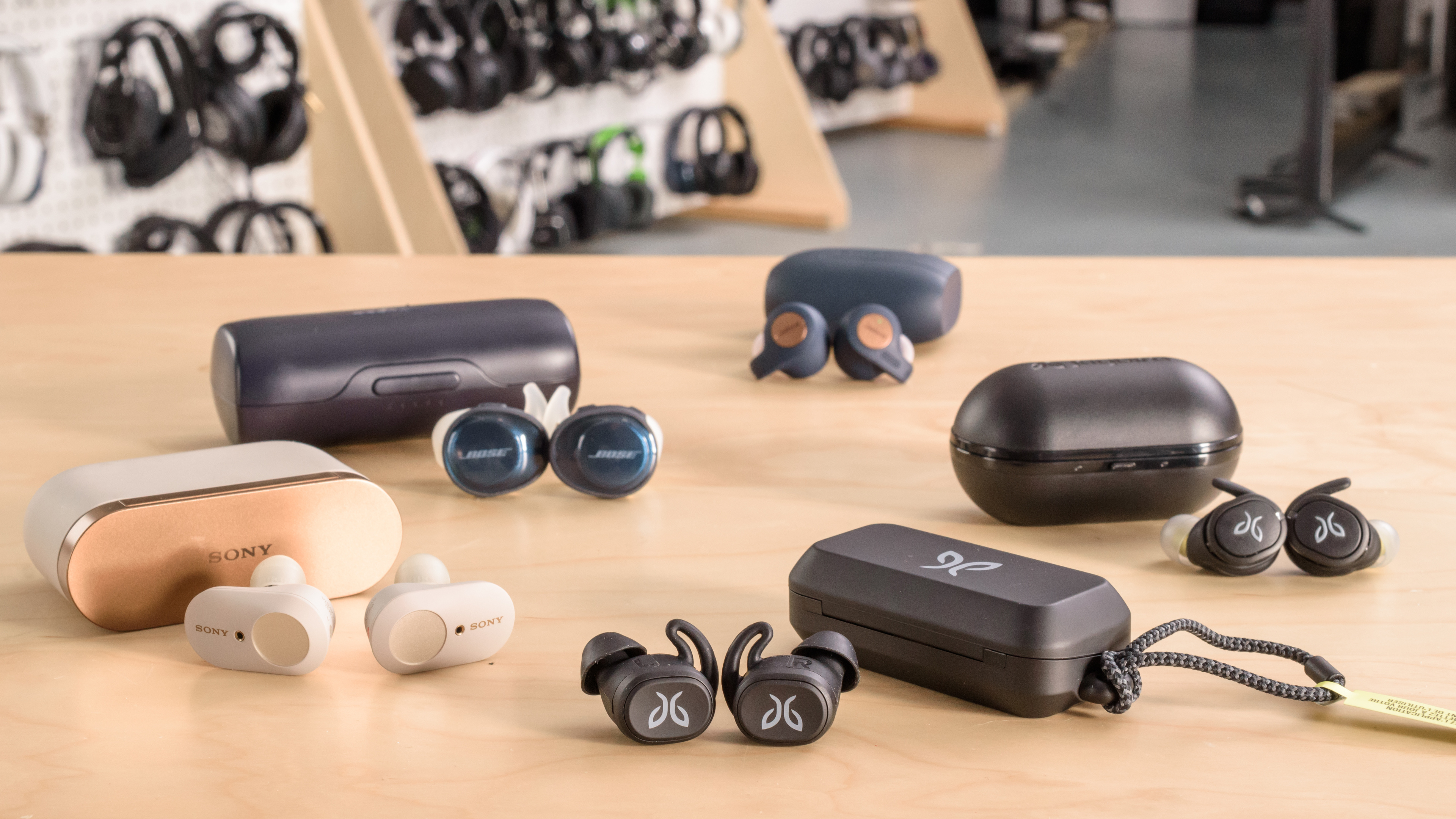
The Jaybird Vista are great sports headphones that have a well-balanced sound profile, which can be easily adjusted to your preference. They might not offer as much battery life as other competing models, but they are very stable and well-designed for their intended use. See our recommendations for the best true wireless earbuds, the best wireless earbuds for running, and the best earbuds and in-ear headphones.
The Jaybird Vista and Jaybird Run XT Truly Wireless are very similar sports headphones, but the Vista are a slight improvement. They are a bit more comfortable, and their case is noticeably smaller, which makes it easier to slide it in your pockets. Their controls are easier to press, and they feel a bit better built, as well. They also offer a bit more battery life. On the other hand, the Run XT take less time to charge, and their fit isolates better against ambient noise.
The Jabra Elite 75t Truly Wireless are similarly-performing truly wireless headphones as the Jaybird Vista Truly Wireless. The Jabra Elite 75t have more comprehensive controls, have a better noise isolation and microphone performance. On the other hand, the Jaybird Vista have a better case, a more stable fit, and a more feature-packed app with a parametric EQ.
The Jaybird Vista 2 Truly Wireless are the next generation of the Jaybird Vista Truly Wireless. The Vista 2 offer upgrades like upgrading their earbuds' dust and water resistance rating to IP68, though we don't currently test for this. They also have an ANC system, though it doesn't offer much better performance than their passive isolation performance.
The Jaybird Vista Truly Wireless are slightly better truly wireless earbuds for sports than the Jabra Elite Active 75t Truly Wireless. They have added stability fins which helps them fit more securely than the Jabra. Their charging case is also better-suited for athletes on-the-go. However, the Jabra's microphone has a better recording quality, so your voice sounds better during phone calls. The Jabra have a longer continuous battery life as well.
Test Results

The Jaybird Vista have a fairly conservative design. They don’t protrude too much out of the ears, with a sleek construction and the Jaybird logo printed on both buds’ buttons. They have a sportier look when using the stability sleeves with fins. They come in 'Black', 'Nimbus Gray', 'Mineral Blue', and 'Planetary Green'.
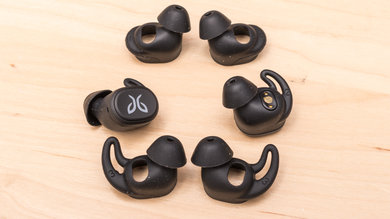
The Jaybird Vista are comfortable in-ears. They're lightweight, don't enter your ear canal too deeply, and don’t apply too much pressure on your inner ear. While they don’t have that many ear tip sizes, you can remove their stability fins if you prefer. However, their in-ear fit might become tiring after a while. Pressing their control buttons might also push them a bit deeper into the ears, which can be uncomfortable.
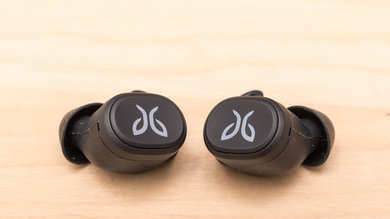
These headphones have a decent control scheme, but it lacks functionality. You can play and pause media or answer calls with a press on either bud and skip tracks forward with a double-tap. However, both earbuds have the same controls, meaning you can’t go back to the previous track, which is disappointing. Holding down the left bud’s button reduces the volume while holding down the right one raises it. You can also map the controls inside their app but won’t be able to have all the controls available at the same time. The controls are easy to use and offer good tactile and audio feedback.
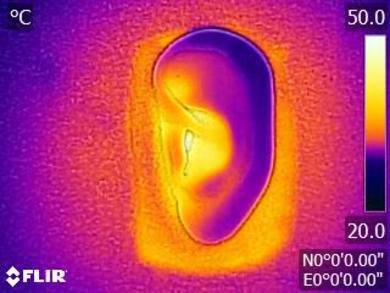
Like most in-ear headphones, the Jaybird Vista don’t trap heat inside your ears, which makes them a suitable option for sports. You shouldn't notice a difference in temperature when wearing them or sweat more than usual.

Like most truly wireless headphones, these in-ears are very portable. The buds are very small and easily fit in pockets or a bag. Their case is pretty small and can be easily carried around.
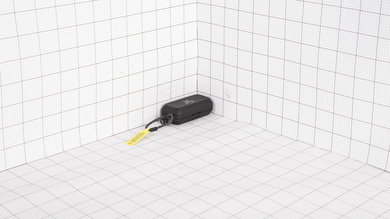
The Jaybird Vista come with an excellent hard charging case. The case is very small and portable. It feels solid and holds about 10 additional hours of battery life. However, it doesn't have any battery indicator lights to show its current charge status and lacks wireless charging capability.

The Jaybird Vista are very well-built true wireless headphones. The buds are small, dense, and should survive drops and bumps without too much damage. They're also rated IPX7 for water resistance, although we don’t currently test this. The case is also very robust and feels as high-end as the buds themselves.
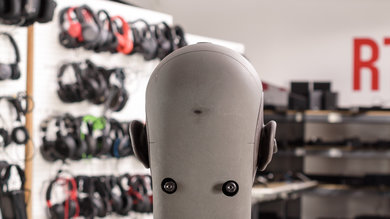
The Jaybird Vista are very stable sports headphones. Like the Jaybird Vista 2 Truly Wireless, they come with a couple of differently-sized ear tips and stability fins to help you get a secure fit. They don’t move around too much and aren't likely to fall out of your ears, even during intense workouts.

- Jaybird Vista headphones
- Charging case
- 3x ear tips and sleeve options
- 3x stability fins
- USB-C charging cable
- Manuals
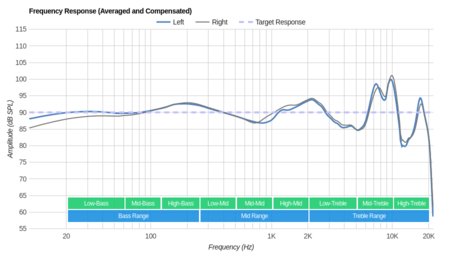
The Jaybird Vista have a well-balanced sound profile. Their well-balanced bass response provides adequate thump and rumble in genres like EDM and hip-hop. Their neutral mid-range yields clear and present vocals and lead instruments. Unfortunately, their uneven treble range makes some higher notes alternatively dull and piercing. Fortunately, their companion app has a selection of audio presets as well as a parametric EQ to fine-tune your listening experience.
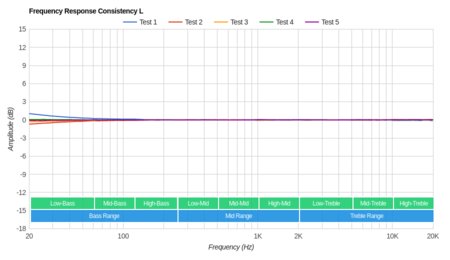
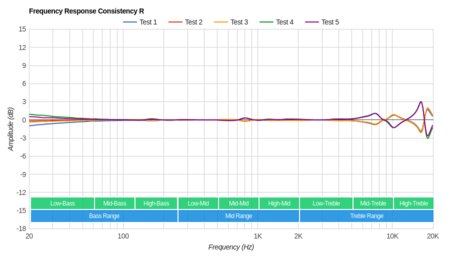
The frequency response consistency is excellent. If you achieve a proper fit using the assortment of tips that come with the headphones, then you should be able to get consistent audio delivery every time you use them.
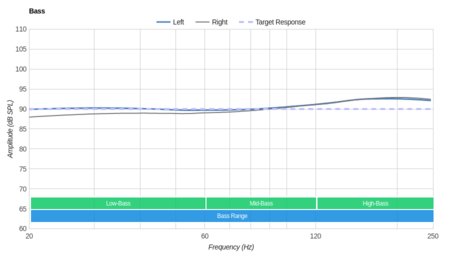
The Jaybird Vista's bass performance is outstanding. It follows our target curve very accurately, meaning that there's sufficient low-end thump and rumble. There’s a small bump in high-mid, which might add a bit of boominess to the overall mix, but it shouldn’t be too noticeable for most.
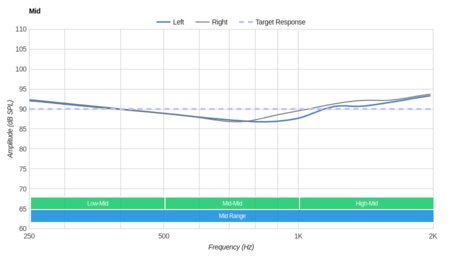
The Jaybird Vista's mid accuracy is excellent. Aside from a shallow dip in mid-mid, which slightly nudges vocals and lead instruments to the back of the mix, the mid-range is amazingly well-reproduced, so vocals and lead instruments are present, clear, and detailed in the mix.
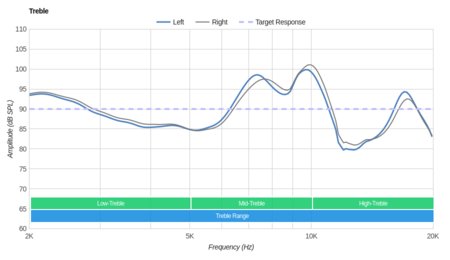
The Jaybird Vista have okay treble accuracy. The response throughout the range is rather uneven. There’s a broad dip in low and mid-treble, which results in a lack of detail and brightness in higher frequencies. However, the response is overemphasized in higher frequencies, resulting in sharp and piercing sibilants. It should be noted that not everyone hears treble frequencies the same way, so your listening experience may vary.
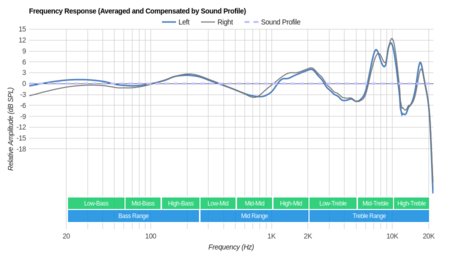
The peaks and dips performance is mediocre. A slight bump in the high-bass range muddies some vocals and lead instruments while the dip in the mid-mids nudges them toward the back of the mix. A peak in the high-mid through low-treble range yields a somewhat honky and harsh quality to some mixes. There's a dip in the low-treble range that dulls the clarity of some instruments, while the following peak in the mid-treble range causes some higher notes to sound piercing and painful.
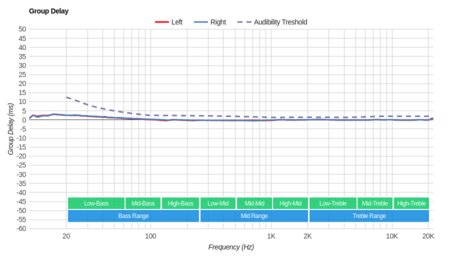
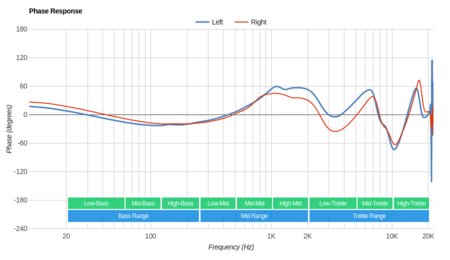
The Jaybird Vista's stereo imaging is superb. Their weighted group delay falls well below the audibility threshold, ensuring tight bass and a transparent treble. Also, the L/R drivers are well-matched in frequency, amplitude, and phase response. This is important for the accurate placement and localization of objects like voices and instruments in the stereo image. Note that these results are only valid for our unit, and yours may perform differently.
The Jaybird Vista's passive soundstage is poor. This is because creating an out-of-head and speaker-like soundstage is largely dependent on activating the resonances of the outer ear. In-ears such bypass any sort of outer-ear interaction. In addition, since these headphones have a closed-back enclosure, their soundstage isn't as open as that of open-back earbuds like the Apple AirPods (2nd generation) Truly Wireless, Google Pixel Buds 2020 Truly Wireless, or the Bose SoundSport Free Truly Wireless.
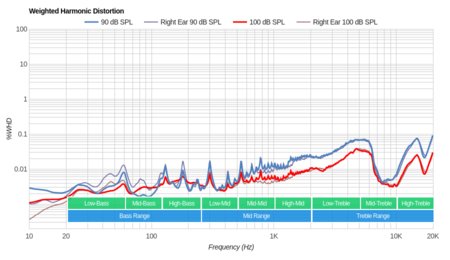
The weighted harmonic distortion performance is very good. Aside from a slight bit of distortion in the low to early mid-treble range, the rest of the frequency spectrum falls within good limits, ensuring mostly clean and pure audio reproduction.
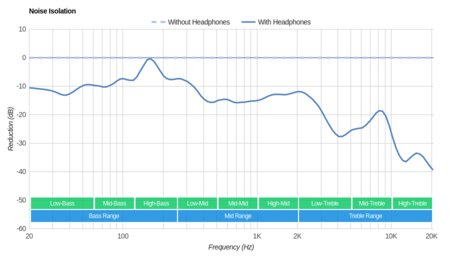
The Jaybird Vista's passive noise isolation performance is acceptable. They don’t isolate too well against low-end noises like the deep rumble of bus or plane engines. On the upside, they do a decent option against noises in the mid-range, like ambient chatter, and isolate even better against high-pitched sounds, such as the hum of an A/C system. If you want headphones with a better isolation performance, check out the Klipsch T5 II True Wireless Sport or the JBL Endurance Peak II True Wireless.
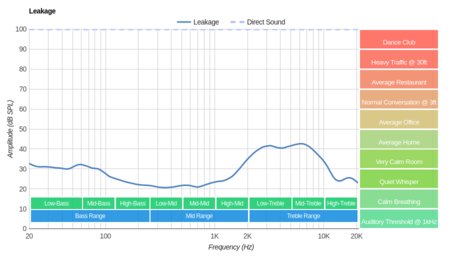
The audio leakage performance is great. A significant portion of the leakage is in the treble range, which means that leaking audio is thin-sounding. The level of sound leakage isn’t too high, so you shouldn’t bother people nearby in a quiet setting while listening to music.
The Jaybird Vista have an integrated microphone.

The microphone's recording quality is poor. Recorded speech sounds muffled and lacking in detail. The microphone also peaks easily and cuts out from time to time.
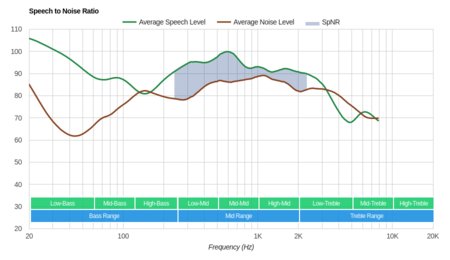
This microphone doesn’t handle noise very well. It struggles to isolate speech from even moderate ambient noise, making these in-ears a poor choice for calls in environments like a busy street. The mic should be fine in quiet environments, however.
The Jaybird Vista have a mediocre battery performance. While their approximately five and a half hours of continuous battery life should be more than enough for workouts, they aren't likely to last a day at work. Worse still, they take over two hours to charge. On the upside, they can turn off automatically after 15 minutes of inactivity to save power. For sports earbuds with better battery performance, check out the Jabra Elite Active 75t Truly Wireless.
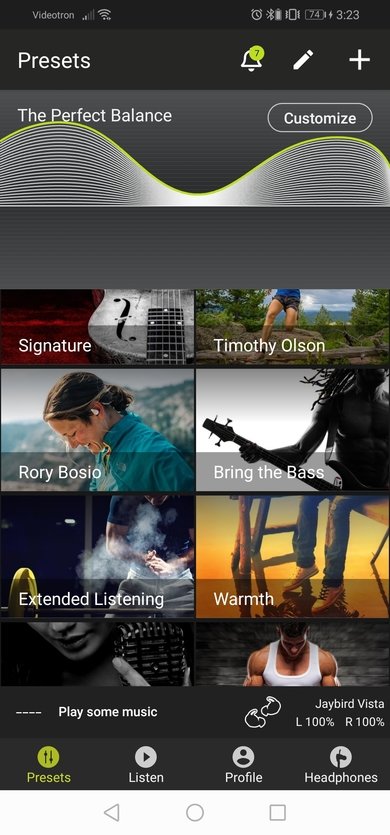
The Jaybird MySound is a great app for iOS and Android that gives you access to a parametric equalizer as well as a community-oriented platform to share your presets and playlists. You can also use it to find the earbuds' last known location if you misplace them. It also offers functions for adjusting their auto-off timer and remapping their control scheme. While they lack some additional features like room effects and an in-app player, the app is a useful tool to personalize your listening experience. Note that the in-app media player is available only after linking your Spotify Premium account inside the app.
These truly wireless headphones support Bluetooth 5.0, but unfortunately can’t be connected to multiple devices simultaneously and don’t support NFC. On the upside, their pairing procedure is quick and easy.
The Jaybird Vista's latency is higher than the average Bluetooth headphones. However, some apps and devices compensate for latency, so your experience in the real world can vary.
The Jaybird Vista are Bluetooth-only headphones.
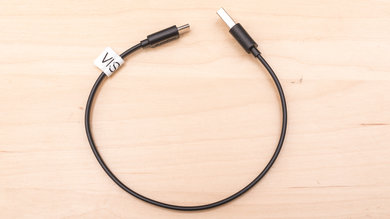
These truly wireless headphones can’t be used with an audio cable. They come with a USB-C cable for charging their case.
These headphones can only connect to Bluetooth-enabled PCs, not PS4 consoles. While they offer full microphone and audio compatibility with these systems, their latency is likely to be too high for gaming.
The Jaybird Vista aren't compatible with Xbox One consoles.
The Jaybird Vista come with a charging case that supplies roughly 10 additional hours of charge. The case doesn’t have any inputs other than the USB-C charging port.

